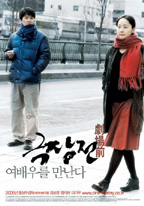

Geuk jang jeon
South Korea 2005
Genre:
Drama, Romance
Director:
Hong Sang-soo
Cast:
Lee Ki-woo
Uhm Ji-won
Kim Sang-kyung
Kim Myoeng-su
Kye Seong-Yong

Tale of Cinema
Story: Jeon Sang-won (Lee Ki-woo) meets his old girlfriend Choi Young-shil (Uhm Ji-won) by chance.
They go out eating something and have a few too many drinks. They spent the night together and decide to commit
suicide. However, this turns out to be not that easy as one would have thought. The two aren't successful and
Sang-won is visited by his father in hospital who takes him home again. It seems that the mother is responsible
for Sang-won's depression, yet she is not willing to take any blame. Can Sang-won really overcome his crisis and go on
living?
Kim Dong-soo (Kim Sang-kyung) is an unsuccessful director, who just watched a movie of his former friend, who is now
in hospital. When he leaves the movie theater he accidently meets the actress of the movie Kim (Uhm Ji-won).
At a meeting that is held to collect some money for the fatally ill director, Dong-soo meets the actress again.
After several cups of alcohol he tells Kim that the dying director actually did tell his life story, which he never
forgave him. With the actress Dong-soo tries to relive his past feelings. The line between movie and reality becomes
more and more blurry for him...
Review: If you happened to get a little bit confused by the story summary, then you already know that you
have to expect an extraordinary movie. "Tale of Cinema" tells the story of a film within a film! The first part is
about the story of Sang-won and Young-shil. With impressive intensity director Hong Sang-soo tells us something about
the meaning of life, depressions and crisis. Stylistically, he intentionally avoids cheap tricks, but keeps the look
of his work very simple. The dialogues, even though most of them seem to serve no purpose at first sight, prove to be
composed with caution. This is also what makes the movie so appealing. Lots of small details that seem to be
unimportant gain in importance later on. Here, nothing is random, but instead there is a deeper meaning behind all of
it.
"Tale of Cinema" is a movie, which presents its message to the viewer in a very suble way. Accordantly, the different
persons all seem a little bit introverted and inscrutable. However, some of the meaningful gestures, actions or
words will give the observant viewer some hints and give him the chance to extract a little bit more out of these
complex characters.
The actors give it their best to keep the intensity of the movie on a high level, and play even the smallest
nuances of emotions with great credibility. Even though, it's sometimes a little bit difficult to understand the
actions and ways of thinking of the different persons, an analysis is always worth the effort.
After the first half of the film we get to know in form of a sudden cut, that the story about Sang-won and
Young-shil was nothing more than a movie. Nevertheless, the story is actually Dong-soo's life. He meets the
actress who played Young-shil and henceforth stays at her side. He wants to relive his past with her.
Interestingly, the story starts to get repititive character. They both (again) get drunk and spent the night
together. Even the cigarette brand Dong-soo is smoking is the same, which is one of the proofs of Hong's great
eye for small details.
However, while the actress of Young-shil is able of telling apart movie from reality, Dong-soo is carried back
to his old feelings of emptiness having the wish to commit suicide again.
But the actress slowly shows him what life is worth. Dong-soo sees his dying friend of old film academy times again and
has to overthink his position and way of thinking.
What's fascinating is that we never get to know if the dying director did really make a movie out of Dong-soo's life.
Sure, they both were friends, but maybe Dong-soo just recognized some parts of his life in the movie and started up
putting himself into the role of a fictitious character.
Direcor Hong manages very well to blur the line between fiction and reality. On the one hand both "movies" in
"Tale of Cinema" have a documentary feeling to them, but on the other hand we always get shown that the whole
thing is nothing more than a movie. Hong does so by using only one artistic trick, that is omnipresent throughout
the whole movie. Every time the two main protagonists talk with each other the camera zooms in. That is getting
pretty unnerving after the 100. time, but at least this way the film makes sure that everyone is aware of the fact, that
the second half of "Tale of Cinema" is also just a movie...
As a movie Hong's work has its lengths, and concerning the directing, because of just mentioned zooming sequences,
the film also has its flaws. However, "Tale of Cinema" is capable of doing something that not every movie can
do nowadays - it leaves you thinking. As a matter of fact, there are no clear answers. To be honest, even the questions
aren't that clear neither, but this is also the movie's intention, although it leaves to viewer oftentimes frustrated.
To understand the questions the different characters have to be analyzed, which is not impossible. So, if you take
your time and are a fan of intelligent art-house cinema you will be able to spend some nice reflective minutes with
"Tale of Cinema".

Disclaimer





















